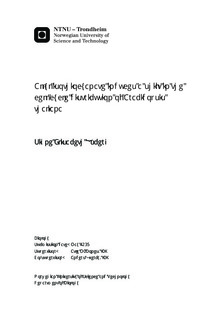Allyl isothiocyanate induces a shift in the cell cycle distribution of Arabidopsis thaliana
Master thesis
Permanent lenke
http://hdl.handle.net/11250/245272Utgivelsesdato
2013Metadata
Vis full innførselSamlinger
- Institutt for biologi [2612]
Sammendrag
Isothiocyanates (ITCs) are degradation products of glucosinolates present in members of the Brassicaceae familiy acting e.g. as herbivore repellents and antimicrobial compounds. Recent results indicate that allyl ITC (AITC) has a role in defense responses such as glutathione depletion, ROS generation and stomatal closure. In this study we show that exposure to non-lethal concentrations of AITC causes a shift in the cell cycle distribution of Arabidopsis leading to accumulation of cells in S-phases and a reduced number of cells in C-phases. Furthermore, transcriptional analysis revealed an AITC-induced upregulation of cyclin-dependent kinase A while several genes encoding mitotic proteins were downregulated, suggesting an inhibition of mitotic processes. Interestingly, visualization of DNA synthesis indicated that exposure to AITC reduced the rate of DNA replication. Taken together, these results indicate that non-lethal concentrations of AITC induce cells of A. thaliana to enter the cell cycle and arrest in S-phase, presumably as a part of a defensive response. Thus, in accordance with other recent publications, this study indicates that AITC has several roles in plant defense and is more than an herbivore repellent or antimicrobial compound. Our data add to the increasing pool of evidence showing that glucosinolates and their degradation products might have multiple functions in planta.
